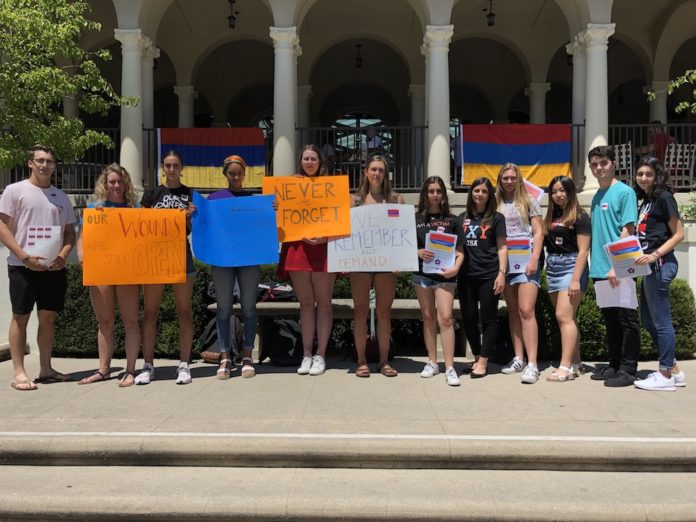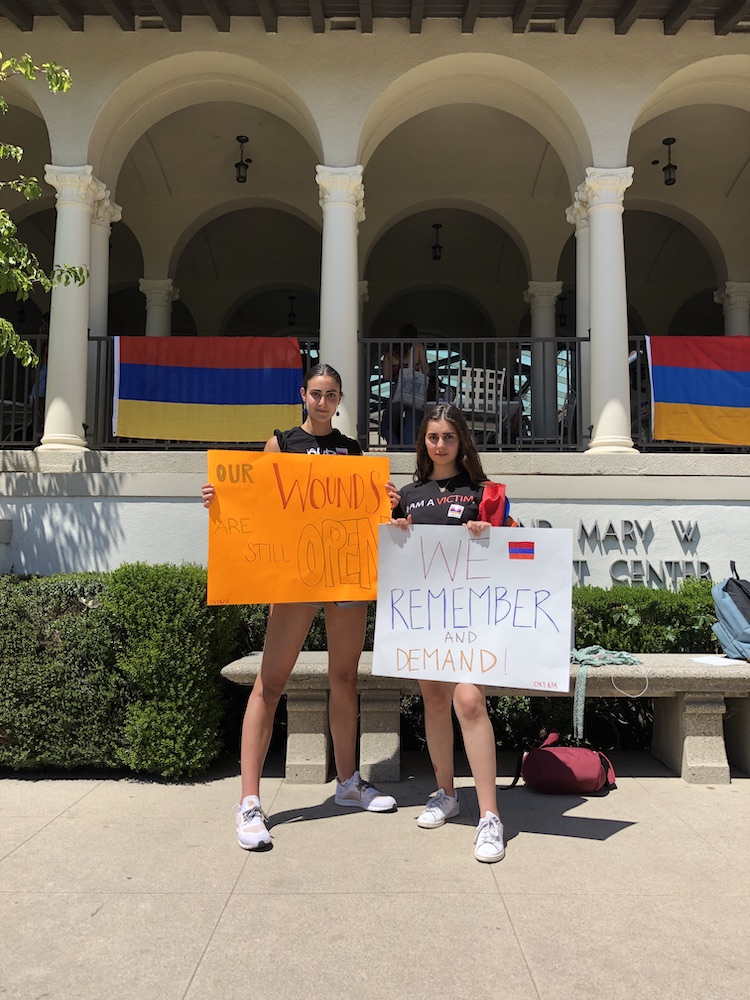
Occidental’s Armenian Students Association (ASA) hosted a series of events throughout the week of April 22 commemorating the Armenian Genocide that began 104 years ago. The series included educational events on the quad, a fundraiser for a youth summer camp in Armenia and a screening of the 2016 film “The Promise.”
On the official Remembrance Day April 24, ASA members hosted a quad sit featuring various posters with key phrases related to the genocide such as “We Remember and We Demand,” and “Our Wounds are Still Open.”
The legacy of the Armenian Genocide informs the connections and identity of Armenians today, according to Lori Berberian (junior).
“Whether you are a third generation Armenian-American born and raised in LA, like me, or a Syrian-Armenian refugee seeking asylum in Beirut, or LA, we all share trauma inherited from the genocide,” Berberian said. “Armenians therefore, in my experience, have a strange cosmic connection to one another because of this shared history. Our identity is greatly influenced by these tragedies. But it isn’t all negative. There is also a very strong narrative around survival and resilience embedded in our identity.”
From 1915 to 1923, 1.5 million Armenians were massacred by the Ottoman Empire, according to the Los Angeles Times. The United States has yet to formally recognize the events as genocide, with the last president to do so verbally being Ronald Reagan in 1981.
Luci Masredjian, director of disability services & student support, said she first experienced formal recognition of the Armenian Genocide in an academic setting when she was in college. While visiting a friend at the University of California, Santa Barbara (UCSB), Masredjian was sitting in on a history class during which a professor spoke about various genocides throughout human history. The professor briefly mentioned the Armenian Genocide and confirmed with the class that they were all familiar with it.
“I had lived like 20 years of my life and I had never heard anyone talk about it,” Masredjian said. “To have it be said like, ‘Of course, this is a fact,’ was really validating, but also frustrating that it was the first time in my life that it had come up.”
A variety of reasons have been attributed to the United States’ lack of recognition of the atrocity as an official genocide. According to the Los Angeles Times, Turkey has paid U.S. lobbying groups millions to warn against possible political impacts of proposed resolutions recognizing the Armenian Genocide, including California’s 28th district U.S. Rep. Adam Schiff’s proposed resolution.
Outside of Russia and Armenia, Los Angeles is the largest Armenian community in the world, with roughly 200,000 people of Armenian descent in the metropolitan area, according to the Los Angeles Times. Glendale, just three miles west of Occidental’s campus, is roughly 30 percent Armenian. The mayor of Glendale, Ara Najarian ’82, is an Armenian American as well as an alumnus of Occidental College. Masredjian attributes the high concentration of Armenians in Los Angeles to the cohesiveness of the community.
“When you almost lose everything in your whole identity, you cling to it,” Masredjian said. “You have an infinite amount of pride about it, so you stick together.”
When Serena Pelenghian*, co-president of ASA, arrived at Occidental after attending Armenian schools her whole life, she revived the Armenian Student Association with her current roommate, Lara Minassians (sophomore), also a Los Angeles native. With a small Armenian population at Occidental — Pelenghian estimates there are about 15 currently enrolled — the club was not active when Minassians and Pelenghian arrived on campus in Fall 2017.

Outside of the Genocide Commemoration events, ASA engages in a variety of activities related to their culture. The group eats at Armenian restaurants throughout Los Angeles, attends an annual meetup of ASA chapters from various colleges at Big Bear Lake and hosts fundraisers. ASA, which is open to all students, gives members the opportunity to both celebrate and share Armenian culture, according to Berberian.
Andrew Snyder (freshman) joined ASA as a way to enhance his connection with his Armenian roots.
“Given that my Armenian side of the family lives far away, it wasn’t always easy to maintain a connection with this part of my identity,” Snyder said. “I joined ASA so that I could regain that connection with my Armenian heritage and meet a new group of people coming from a similar cultural background.”
The April 23 fundraiser, held as part of the Commemoration Week, benefitted Our Lady of Armenia Summer Camp in Gyumri, Armenia. The camp, which co-president Minassians volunteers at annually, serves disadvantaged children from different parts of Armenia, especially the northern zones most often hit by earthquakes.
The commemoration events concluded with a screening of the 2016 film “The Promise” in Choi Auditorium April 24. The film depicted the atrocities of the Armenian Genocide while following a love triangle between an Armenian medical student, an Armenian woman and an American journalist.
“A Hollywood film is a good way to reach the masses and spread international awareness around the Armenian Genocide,” Berberian said. “[The film also] sheds light on the unjust denial of the Armenian Genocide by the Turkish government and the continued refusal by the American government to officially recognize it.”
Alex Hall (senior), a native of Glendale, grew up around Armenians and was educated about the Armenian Genocide at a young age.
“From my perspective, attending the movie was not only educational, but also sentimental,” Hall said. “I believe it honored and exemplified the strength of the Armenian community.”
Masredjian first viewed the film with her family, including her grandfather, who fled the genocide at age 5 and was orphaned.
“I remember watching it and feeling like, ‘Oh my god, I’m sitting with descendants of survivors,” Masredjian said. “It’s very powerful.”
*Pelenghian is a staff writer for The Occidental.
![]()


































